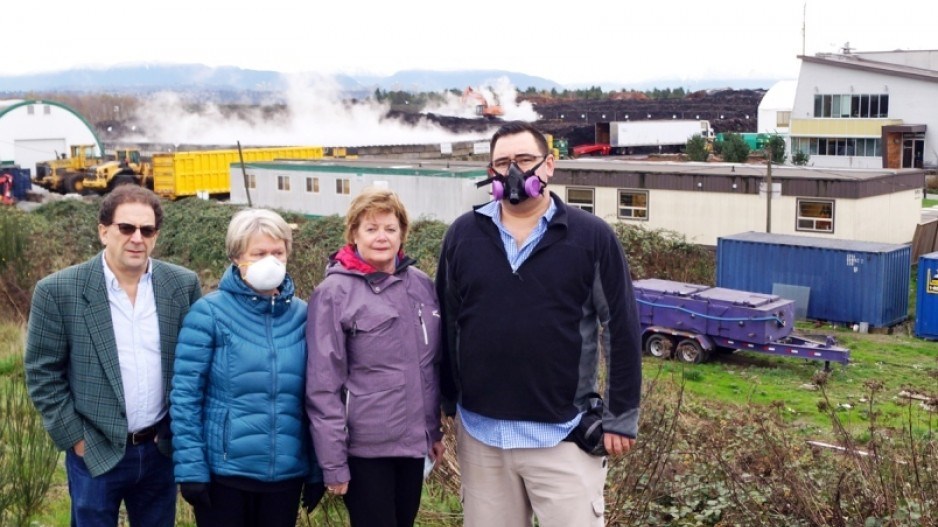A failed open-air composting operation in east Richmond has left Vancouver Fraser Port Authority, a federal agency, with an estimated $24 million clean up bill.
The creditor protection proceedings surrounding Harvest Fraser Richmond Organics, a subsidiary of U.S.-based Harvest Power, are reaching an implementation phase after several reports from monitor Ernst and Young Inc. pegged the clean up cost of close to 400,000 cubic meters of organic waste and the deconstruction of a waste-to-energy system at between $15.3 million to $35.8 million.
Port spokesperson Danielle Jang said the authority is a self-sustaining, arms-length government entity that will be able to recoup the costs without taxpayer dollars. In 2017 the port showed operating revenues of $246 million.
But the closure of Harvest Power’s facility late last year also means a combined $7.5 million investment from all three levels of government will be for not.
The subsidiary company only has about $6.4 million to $7.2 million in assets, including cash, past due payments, finished product and fixed assets. Millions of dollars will have been lost by having to sell finished product for one-third the average price of $18 per cubic yard, or even giving it away. One auctioneer valued its fixed assets at $4.3 million.
Because of the corporate structure, the parent company Harvest Power is also a creditor.
The port is continuing to assess the clean-up options for the Harvest Power site.
“As next steps, we are reviewing the site to better understand the required clean-up and costs estimated in the Ernst & Young monitor’s report. In terms of cost recovery and its future use, this is still to be determined,” stated Jang, adding the port is responsible for the environmental protection of the land in its jurisdiction.
The material is expected to take a number of years to fully clean up.
The facility faced significant pollution fines and backlash from Richmond residents shortly after Metro Vancouver established an organics ban from landfills in 2015. The facility began taking excessive amounts of waste that created putrid odours across the city for years.
A new air quality permit in 2016 dictated that the facility had to improve its operation’s odours. But the monitor’s report noted the company abandoned its plans to spend about $4 million on upgrading its existing composting system as it anticipated a renewed 2020 permit would require an expensive indoor facility, which would have proven economically unviable. And so, last August the company announced it would close shop.
In March 2017 the company also had to shut down its “energy garden” which converted gases to electricity. As such, an agreement with BC Hydro has been terminated. BC Hydro said it has lost approximately eight gigawatt hours a year from the contract.
Harvest Power took a millions of taxpayer cash to build the energy garden (an anaerobic digester).
Natural Resources Canada (NRC) provided $5 million for the $23 million energy garden and Metro Vancouver provided $2 million for overall site upgrades. An additional $500,000 grant came from the provincial government.
NRC and Metro Vancouver told Glacier Media they did not apply to be a creditor. Meanwhile the provincial government did recoup a $1 million loan previously made to Harvest Power.
Harvest Power paid the port $500,000 annually for the lease, which expires in 2032. Jang said the lease will be cancelled and the port will forge ahead with plans to re-lease the site, potentially to a warehouse company.
The use of the site for composting ran contrary to the port’s mandate under the Canada Marine Act, noted the report. This had been a bone of contention with critics of the facility, who wanted the port to take action against it.
“Our intent is to see the site used more appropriately, as per the Canada Marine Act, for trade-related purposes.
“We would also like to see this land used as efficiently as possible because there is a severe shortage of trade-enabling industrial land in Metro Vancouver,” stated Jang.
No port executives were made available for comment.
Harvest Power’s closure in Richmond has meant more organic waste being diverted to other regional sites.
Similar odour complaints are now being fielded from Delta where Green for Life Environmental (GFL or Enviro Smart) is also operating an open-air compost pile.
But GFL has submitted a building permit application for a new 137,326 square foot composting building operated under negative air pressure connected to a 30,000 square foot bio-filter, according to the City of Delta.
Because the site is on the Agricultural Land Reserve GFL must use 50 % of its finished product on farmland, according to Kim Groat, CEO of the Agricultural land Commission. Groat added that the facility would comply with ALC regulations and it is a matter of Delta approving building permits.




